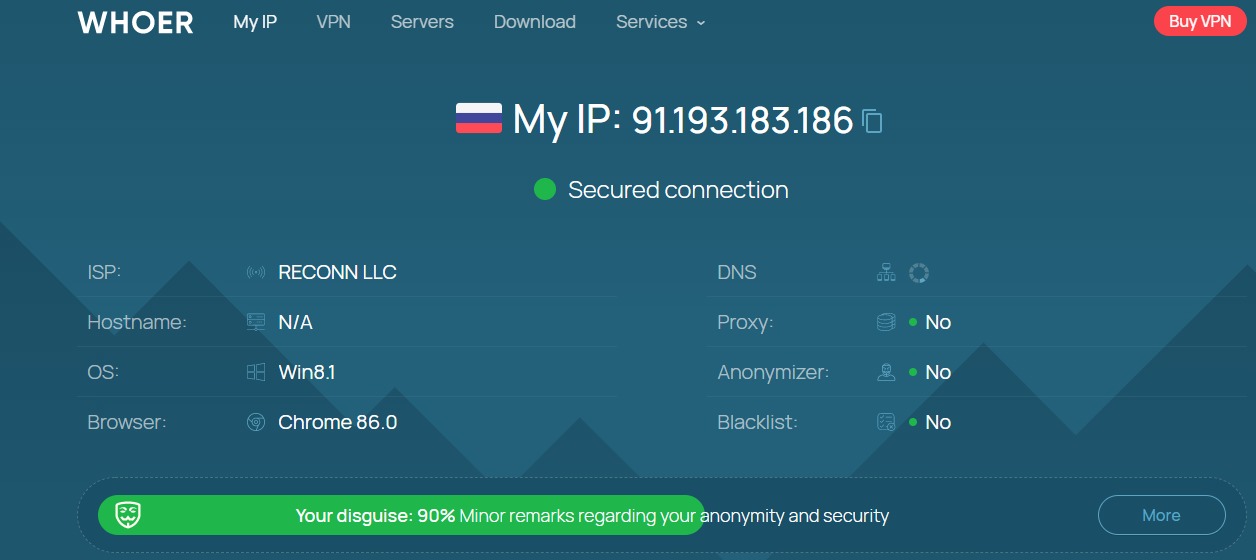Every Internet user has opened a site in incognito mode at least once. In the modern online landscape of 2025, where websites use advanced tracking systems, users are increasingly aware of the risks of leaving extensive digital footprints.
Private browser with mobile emulation –10% OFF with WHOER
For example, people use Incognito mode to hide browsing history at home, at work, or on shared devices. Many turn to Incognito mode for privacy when accessing email, conducting sensitive research, or simply maintaining discretion online.
Meanwhile, information about you and your interests can be accessed by malicious actors who may misuse it. For users sharing devices or using public networks, Incognito mode provides an additional layer of privacy, safeguarding sensitive information.
It’s important to recognize the limitations of Incognito mode: it does not make you fully anonymous online. Websites can use fingerprinting and other tracking technologies that are beyond the capabilities of the browser’s private session. For enhanced privacy, advanced tools like private browsers can be used responsibly.
What is browser incognito mode?
Incognito mode has gained popularity as data collection has become pervasive. Your Internet provider can still see your traffic, while browsers normally store history, cookies, form data, and information about downloaded files. Websites collect information such as IP address, location, language, and more. Search engines track user attributes including age, interests, and preferences.
Incognito Mode, also called Private Browsing, InPrivate Browsing, or Private Window, allows users to control their online data. It operates as a temporary session, clearing all local data—including browsing history, cookies, and cache—when the session is closed.
Key features of incognito mode:
- The device does not save your browsing history.
- Cookies and site data are removed when leaving incognito mode.
- Form entries are not saved locally.
Bookmarks and downloaded files are retained.

However, Incognito mode does not prevent websites, system administrators, or Internet providers from accessing your data. Browsers like Google Chrome and Mozilla display a warning about this whenever incognito mode is enabled.
Common myths about incognito mode
Despite warnings, several myths surround incognito mode. Here’s a breakdown with recommendations on how to protect your privacy online.
Myth 1: Incognito mode hides your location
Your location is determined by your IP address. Websites can detect your IP regardless of incognito mode.
Myth 2: Incognito mode makes your actions completely untraceable
Internet providers, system administrators, and public network operators may log traffic. Incognito mode only prevents local storage of data, not tracking by websites or networks.
Myth 3: Incognito mode protects against viruses
Viruses are mostly contracted via downloads and untrusted applications. Incognito mode does not prevent this. Using a reliable antivirus program is essential.
Myth 4: Incognito mode prevents targeted ads
Websites and search engines track activity even in private sessions, creating user profiles for advertising. Using a VPN, Tor, or privacy-focused browser extensions enhances privacy.
Myth 5: Incognito mode makes you fully anonymous on websites
Incognito mode does not provide full anonymity. Websites can use fingerprinting and other technologies to identify users. Local data storage is cleared, but identification remains possible.
Checking your anonymity online
To evaluate your anonymity, visit Whoer.net.

Click on “Your anonymity” and follow the instructions to improve your privacy. Learn more about reaching full anonymity in our guide.

Tools for enhanced online privacy
Browser Extensions
Extensions can block cookies, tags, web bugs, and trackers, reducing exposure. However, they do not hide your IP or encrypt traffic.
VPN
A virtual private network (VPN) hides your IP, encrypts traffic, and prevents your provider from logging browsing history. Attackers cannot access encrypted traffic. See our VPN selection guide for recommendations.
Tor
Tor is a privacy-focused browser that helps protect your online activity by routing traffic through multiple nodes, enhancing anonymity, and allowing access to websites while maintaining privacy and bypassing regional restrictions responsibly. Read more in our article.
Tor does not provide end-to-end encryption and can be blocked by some providers. Using a VPN alongside Tor enhances privacy.
Private Browsers
Private browsers provide additional protection against fingerprinting and tracking. They allow creating separate profiles, helping users maintain online privacy responsibly.
The Wade browser generates unique fingerprints for each session, preventing tracking. It also manages cookies efficiently, allowing import/export and maximum control over online presence.
For questions, contact our Telegram channel for guidance.
Legal Disclaimer
This article is for educational and informational purposes only. Always use VPNs, Tor, and private browsers legally and in compliance with website rules and local laws. Privacy tools are meant to protect data responsibly.
Caring for you and your security, Mr. Whoer